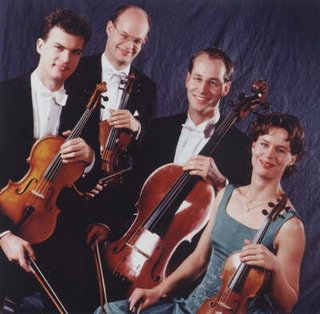 Haydn does not get his due in concert halls in this country – but at least in chamber music recitals his neglect is not as pronounced as in all other genres. (When was the last time you heard a Haydn symphony in concert?!) It took a German string quartet (after all, Germans owe their national anthem to a Haydn string quartet) to program the first Haydn of the season: last Friday at the Library of Congress, where the Mandelring Quartett performed op. 20, no. 3 – a work that is not any less delightful than its more famous successors for still having been a pioneer of the string quartet form as we know it.
Haydn does not get his due in concert halls in this country – but at least in chamber music recitals his neglect is not as pronounced as in all other genres. (When was the last time you heard a Haydn symphony in concert?!) It took a German string quartet (after all, Germans owe their national anthem to a Haydn string quartet) to program the first Haydn of the season: last Friday at the Library of Congress, where the Mandelring Quartett performed op. 20, no. 3 – a work that is not any less delightful than its more famous successors for still having been a pioneer of the string quartet form as we know it.The three Schmidt siblings Sebastian, Nanette (violins), and Bernhard (cello) who form the quartet together with violist Roland Glassl gave this effortlessly charming piece all the lightness, cohesion, and delicacy that it needed. A true ensemble, they played ‘as one’ – with notably beautiful viola-playing and tone from Mr. Glass. If their performance is not going to make audiences demand more Haydn on concert programs, nothing will. To think that Haydn went on to write 40 more string quartets after op. 20 (altogether he wrote 70 to 76, depending on attribution issues) dazzles the mind.
‘Dead’ is good business – a darkly ironic but nonetheless true maxim (Tower records registers record sales, these days) – and György Ligeti probably never saw such a run on recordings of his works as has occurred since June of 2006, when this fabulously precocious and playful composer died at 83. In concert, it should be admitted, his string quartets did not need that rather morbid enticement; they were played frequently enough… with great gusto and usually to a very receptive crowd (Left Bank, Pacifica, Brentano). Certainly the sophisticated selection of ears that turns out to the Library of Congress’s events knew how to appreciate this nocturnal, creepy-crawly, eerie, and delectable music as well as a pristine and generous performance of it.
 J.Brahms (& F.Gernsheim), SQ4t op.51/1 (& op.31), Mandelring Quartet audite     |
You know a great performance of any of the Brahms String Quartets if you have enjoyed it. All high-brow (with big furrows on it), these works cannot attain the easy-going humor, unburdened joy, and musicality of Haydn’s examples. Beethoven’s masterpieces are not matched in ingenuity or the way the material is laid out in a spiritually compelling manner. Full of great ideas, the obsession with delivering perfect craftsmanship and something determinedly worthy of his famous predecessors in this genre (Haydn, Mozart, Beethoven, Schubert), Brahms’ quartets always sound like ‘trying too hard’ to me. Lulled by momentary beauty or enthralled by a particularly propulsive motif I am fascinated with plenty in op. 51, no. 1 – but once such a passage passes by, I cannot seem to recall it or carry the feeling over to whatever comes next. If the Mandelring Quartet (named after the street the Schmidt siblings lived on) failed to keep everyone focused on the music, their engaged (though not faultless) performance was not to blame.


No comments:
Post a Comment